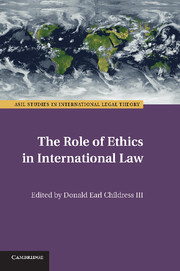Book contents
- Frontmatter
- Contents
- Contributors
- Acknowledgments
- Introduction
- Part one The Role of Ethics in Public International Law
- Part two The Role of Ethics in Private International Law
- 4 The Problem of Provenance: The Proper Place of Ethical Reasoning in the Selection of Applicable Law
- 5 Choice of Law as General Common Law: A Reply to Professor Brilmayer
- 6 A Reply
- 7 The Natural Law Challenge to Choice of Law
- 8 The Role of Ethics in U.S. Private International Law
- Part three Normative and Theoretical Perspectives
- Index
- References
5 - Choice of Law as General Common Law: A Reply to Professor Brilmayer
Published online by Cambridge University Press: 05 December 2011
- Frontmatter
- Contents
- Contributors
- Acknowledgments
- Introduction
- Part one The Role of Ethics in Public International Law
- Part two The Role of Ethics in Private International Law
- 4 The Problem of Provenance: The Proper Place of Ethical Reasoning in the Selection of Applicable Law
- 5 Choice of Law as General Common Law: A Reply to Professor Brilmayer
- 6 A Reply
- 7 The Natural Law Challenge to Choice of Law
- 8 The Role of Ethics in U.S. Private International Law
- Part three Normative and Theoretical Perspectives
- Index
- References
Summary
Introduction
In the first footnote of her chapter, Lea Brilmayer mentions “significant overlap” with two recent papers of mine. If anyone should be making acknowledgments, I should. She has long argued that the law of choice of law, even in its modern interest-analysis incarnations, is a disguised form of general common law, and that it ought to be reformed in the spirit of Erie. In taking up this argument myself, I am in her debt.
To get the basic idea, consider a variation on Kuchinic v. McCrory. Assume a Georgia pilot invites another Georgian to fly with him to attend a football game in New York. On the way the plane crashes in Pennsylvania. A Georgia statute prohibits guests from suing their hosts for negligence. Pennsylvania law has no such prohibition. Had it entertained the action, the Georgia Supreme Court would have applied Pennsylvania law to the facts. However, the guest chooses to sue the host in Vermont state court instead. May it apply Georgia law?
- Type
- Chapter
- Information
- The Role of Ethics in International Law , pp. 125 - 135Publisher: Cambridge University PressPrint publication year: 2011



